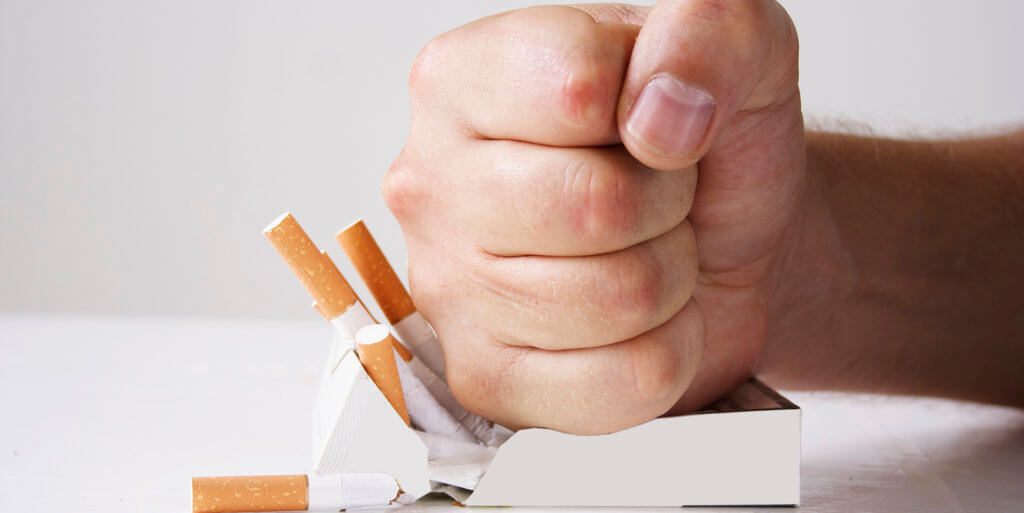
You know you should quit smoking. You know all about the health risks associated with smoking, you've been lectured on them time and time again by both strangers and loved ones. In fact, you've been lectured on the health risks of smoking so much that you have defiantly kept smoking for years as an expression of your free will. You don't like the idea of being told you ought to do something or that you have to do something. After all, it's your choice whether or not to smoke and only you make those decisions. But then one day you realize, it should also be your decision whether or not to quit, and your dependency on nicotine is trying to rob you of that choice. And now the same defiance that kept you smoking to spite all the busy bodies and do-gooders has fueled you to quit smoking once and for all! Ok, maybe you're not ready to quit yet, but you're at least thinking about it which is why you followed the link to this story.
The nicotine in tobacco is psychologically addicting while also causing the body to become physically dependent upon it. Within 7 seconds of inhaling tobacco smoke nicotine begins to bind to receptors within the central nervous system known as nicotinic acetylcholine receptors, or NCR's. This causes the release of several neurotransmitters such as dopamine that create a "feel good" sort of euphoria. Nicotine also causes the release of adrenaline creating a rush feeling. Nicotine is unique in that it simultaneously acts as a stimulant and relaxant creating a sense of calmness and alertness at the same time. To go along with the nicotine, tobacco smoke contains several substances known as monoamine oxidase (MAO) inhibitors which interfere with the MAO's enzymes responsible for breaking down the "feel good" neurotransmitters. This causes more of the neurotransmitters to continue circulating in the body than there normally would be, causing the effects to last longer.
Your body becomes addicted to nicotine after prolonged use of tobacco causes your body to compensate for these increases in adrenaline, dopamine, serotonin, norepinephrine, and other neurotransmitters and hormones. Now, when you quit smoking, your body will go through withdrawal as your body adjusts to not processing nicotine every 2-3 hours. Fortunately, nicotine withdrawal is a bit more mild than other addictive substances such as heroin or alcohol. The physical withdrawal of nicotine generally last 2-3 days and symptoms include agitation, frustration, restlessness, problems concentrating, increased appetite, anxiety, depression, and headaches. After the effects of the physical withdrawal wear off, the remaining addiction is psychological and mostly revolves around cravings.
In order to better be prepared to quit smoking and deal with these withdrawal symptoms, here are some tips of things you need to do before you quit:
-
First you must decide why you want to quit. It has to be a precise reason that speaks to you and your desire to stop smoking. To say "because it's bad for me" is not a good enough reason because it is too general and you have known the entire time you've been a smoker that it was bad for you. You also can't say you are going to quit for your kids or your spouse or anyone else that isn't you. You are the one who is choosing to end your addiction to tobacco so you have to pick a reason for yourself to longer smoke.
-
After you quit smoking, it will be impossible to avoid all stressful situations, triggers and other smokers, despite your best efforts to avoid them. You must have a plan in place to deal with cravings when they arise. Cravings while you are quitting may also exacerbate stress you are already feeling. Cravings general only last 2-3 minutes before the feeling subsides, even though sometimes it can feel like hours. To be successful in your attempt to quit, it is important to remind yourself that the craving is a temporary feeling that will soon pass, and to have a plan to deal with it for the few minutes it lasts. For more ways to deal with cravings, here is a link to our article on tips for quitting smoking.
-
Know your triggers. If you are someone who always smokes after a meal or while talking on the phone, have a plan in place to deal with those specific situations. Giving up eating or answering your phone for the rest of your life is not going to be an option, so it has to be something that is both practical and effective. Having a plan to deal with this situations ahead of time will make it easier to deal with the cravings that coincide with each trigger. Then, when a surprise trigger arises, you can apply the same technique you used to deal with the other triggers you've faced.
-
If you are planning to use a smoking cessation product such as patches, gum, or prescription medication, be sure you obtain it before your quit date. If you need a prescription, be sure to see your doctor in time. Some insurance companies will cover some part of the cost of smoking cessation products so it is a good idea to check and see what your plan will cover.
A big trigger for recently quit smokers is being in an environment with lots of smoking products lying around, such as ashtrays or lighters, or an environment that smells of tobacco smoke. One of the first things you should do when you quit is to get rid of old ashtrays, hide the lighters, and wash any clothes, drapes, furniture, carpets, or vehicles that smell like smoke. Plan ahead to know when you will do this and to make sure it is close to your quit date. If you live with someone who smokes and does not plan on quitting with you, have a conversation with them about smoking only outdoors and not inside any shared vehicles
